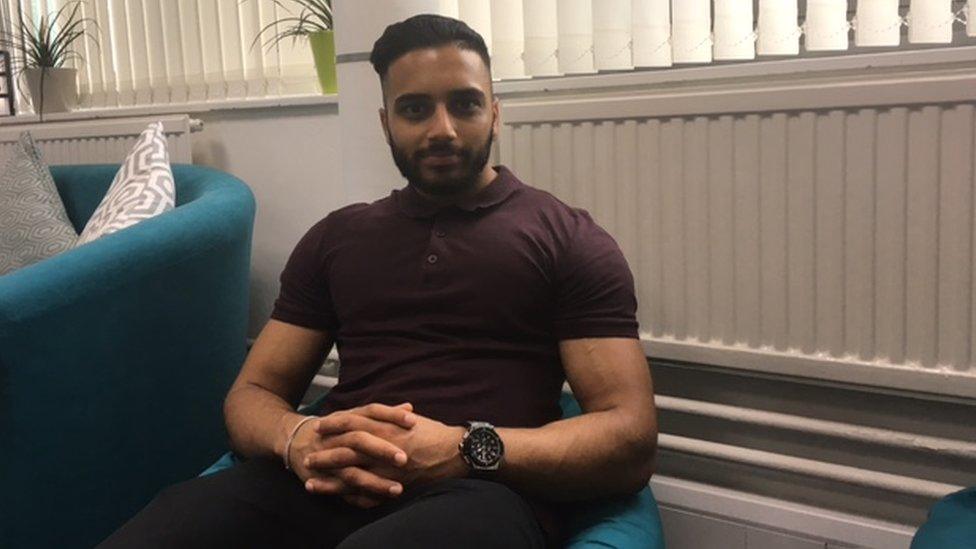'I couldn't talk about having an eating disorder'
- Published

Priyesh lied to doctors about how severe his bulimia was
A 24-year-old man is hoping that by speaking about his experience of suffering from bulimia, it will encourage other Asian men in a similar situation to seek help.
Priyesh Vyas has successfully applied to be an ambassador for the eating-disorders charity Beat.
He is the first Asian male to take on the role, and he hopes to go into schools to raise awareness.
The charity currently has about 150 ambassadors.
Priyesh says: "For people from my own ethnic background, I know how difficult it is.
"You don't really want to talk about having an eating disorder, especially for males.
"Asian males are put up as this strong figure, and nothing can be wrong with them.
"It started around 15, and it went on until I was 18 - those were the toughest times.
"We find with eating disorders, they can relapse.
"It definitely affected my grades at school.
"I was predicted As and A*s at GCSE and barely scraped Cs and Ds."
Eventually, a teacher raised concerns with Priyesh's parents, who took him to see a doctor.
"Because we went to a doctor with my parents, I didn't come out with the truth," he says.
"So, I basically lied to the doctors about how severe my bulimia was.
"Eventually, I realised I needed to stop this.
"I needed good food and energy in order to work out properly.
"It was almost like a light-bulb moment for me. "

About eating disorders
Bulimia involves binge-eating and self-induced vomiting, while anorexia is associated with self-starvation
Eating disorders claim more lives than any other mental illness - one in five of the most seriously affected will die prematurely
Although serious, eating disorders are treatable conditions and full recovery is possible
Treatment can range from counselling to medication
20% of people who use Beat's support services are male
Source: Beat, external

Recent figures show that men remain a small minority of those receiving treatment for eating disorders.
About 1,200 (8%) were treated last year, although the number of men receiving outpatient treatment for an eating disorder in England grew twice as fast as that for women.

Priyesh found social media didn't help his low self-esteem
There is no one factor that leads to eating disorders, but Priyesh says he was left with low self-esteem as he saw his weight fluctuating.
And social media didn't help.
"You open your phone, and you see perfect everywhere," he says.
"You look in the mirror and you don't feel quite the same."
There is an application process to become a Beat ambassador.
References are also needed to ensure a person is well enough to take up the role.
Priyesh says he wanted to get involved after writing a blog post.
Stereotypes
"It gave me the confidence, because the post got 10,000 reads around the world and it was amazing to see the response I was getting from males especially," he says.
A Beat representative said: "Eating disorders are stereotypically seen as illnesses which affect young, white females.
"In turn, this can make it difficult for anyone who does not fit into this preconception to recognise their illness, come forward and find treatment.
"We work hard to break down these stereotypes - we know the sooner someone finds the treatment they need, the more likely they are to make a full and fast recovery."
Outside Beat's helpline centre in Warrington, Priyesh shows me his kick-ups.
He says one of the best things about his recovery is that he is playing football again.
"I had to stop doing it because I had no confidence and no energy," he says.
"The thing I most loved to do I had to give it up, but I'm recovering now and I'm back to playing football - which I love to do."